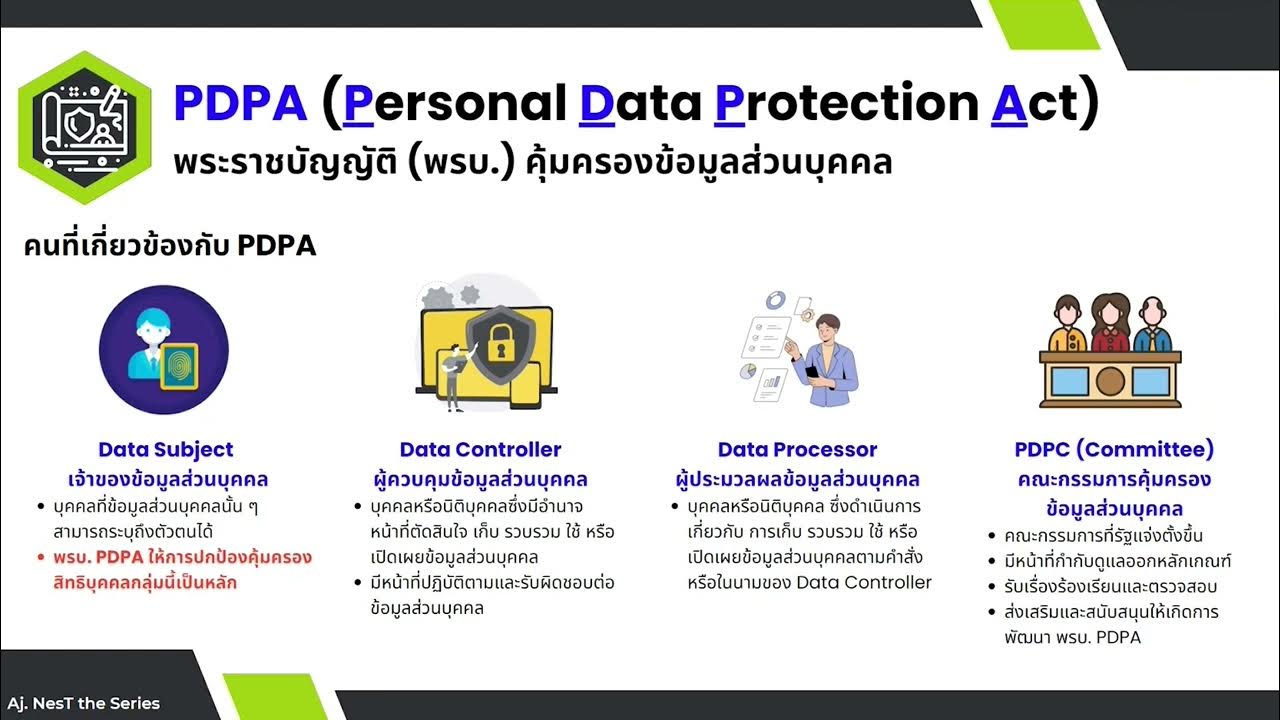คอร์สเรียน PDPA พรบ.คุ้มครองข้อมูลส่วนบุคคล EP.6 สิทธิของเจ้าของข้อมูลส่วนบุคคลที่ทำได้ตาม PDPA
Summary
TLDRThis video script explains the rights of personal data owners under the Personal Data Protection Act (PDBA). It highlights the essential rights of data subjects, including the right to be informed, access their data, request data transfers, and challenge the use or disclosure of their data. It also covers the right to request deletion, correction, and suspension of data use. The video emphasizes the legal consequences for organizations that fail to comply with these regulations, including lawsuits, financial penalties, and reputational damage. The script outlines the importance of safeguarding personal data in today's digital landscape.
Takeaways
- 😀 Data owners have rights under the Personal Data Protection Act (PDBA) to control their personal data.
- 😀 Individuals are entitled to be informed about the collection of their personal data, including what information is collected, why it’s collected, and for how long it will be kept.
- 😀 When collecting personal data, organizations must notify data owners upfront through clear policies, often by obtaining consent through a signature.
- 😀 Data owners have the right to access their personal data and request a copy of the information stored by data controllers.
- 😀 Data owners can request the transfer of their personal data to another data controller if needed.
- 😀 Individuals have the right to object to the collection, use, or disclosure of their personal data and can request that it be deleted or not used.
- 😀 The right to deletion allows data owners to request the destruction or anonymization of their personal data to prevent identification.
- 😀 Data owners can also request the suspension of the use of their personal data by notifying the data controller.
- 😀 If personal data is inaccurate or incomplete, data owners have the right to request correction to ensure it is accurate and up-to-date.
- 😀 Organizations and businesses that fail to comply with data protection laws may face legal consequences, including lawsuits from data owners, resulting in financial and reputational damage.
Q & A
What is the Personal Data Protection Act (PDBA) and who does it protect?
-The Personal Data Protection Act (PDBA) gives rights to individuals, called Data Subjects, over their personal data. It ensures that people have control over their own data and how it is collected, stored, and used by organizations.
What are the rights of a personal data owner under the PDBA?
-Under the PDBA, personal data owners (Data Subjects) have several rights, including the right to be informed about the collection of their data, the right to access the data stored about them, the right to transfer their data, the right to object to data usage, the right to request deletion of data, the right to request suspension of data use, and the right to request corrections.
What is meant by the 'right to be informed' under the PDBA?
-The 'right to be informed' means that individuals must be notified in advance when their personal data is being collected. This includes details about the type of data, the purpose for its collection, the duration of storage, and who will have access to it.
What is the 'right to access' personal data?
-The 'right to access' allows individuals to request and obtain copies of their personal data stored by a data controller. This ensures transparency and allows individuals to verify the accuracy of the data being held about them.
Can a personal data owner request their data to be transferred to another entity?
-Yes, under the PDBA, individuals have the right to request the transfer of their personal data from one data controller to another, ensuring that they can use their data as they wish.
What does the 'right to object' to data collection or use entail?
-The 'right to object' means that individuals can oppose the collection, use, or disclosure of their personal data. If they do not wish for their data to be retained or used, they can request that it be deleted or stopped from being processed.
How can a personal data owner request the deletion of their personal data?
-A personal data owner can request the deletion or destruction of their data if it is no longer necessary for the purposes it was collected. Organizations are legally obligated to comply with such requests in accordance with the PDBA.
What does the 'right to suspension' of data use mean?
-The 'right to suspension' allows individuals to request that the processing of their personal data be temporarily halted. This may be requested if they believe the data is inaccurate or if they object to its use.
What is the 'right to correction' under the PDBA?
-The 'right to correction' allows individuals to request the correction or completion of their personal data if it is found to be inaccurate, incomplete, or misleading. This helps to prevent misunderstandings caused by incorrect data.
What are the consequences for organizations that fail to comply with the PDBA?
-Organizations that fail to comply with the PDBA risk legal action from data subjects, which may result in lawsuits, financial penalties, and damage to their reputation. Legal professionals and consultants may be required to address non-compliance issues.
Outlines

此内容仅限付费用户访问。 请升级后访问。
立即升级Mindmap

此内容仅限付费用户访问。 请升级后访问。
立即升级Keywords

此内容仅限付费用户访问。 请升级后访问。
立即升级Highlights

此内容仅限付费用户访问。 请升级后访问。
立即升级Transcripts

此内容仅限付费用户访问。 请升级后访问。
立即升级浏览更多相关视频

คอร์สเรียน PDPA พรบ.คุ้มครองข้อมูลส่วนบุคคล EP.2 ความหมายของ PDPA คืออะไร

คอร์สเรียน PDPA พรบ.คุ้มครองข้อมูลส่วนบุคคล EP.4 บุคคลที่เกี่ยวข้องกับ PDPA

107. OCR A Level (H046-H446) SLR16 - 1.5 Data Protection Act

Digital Personal Data Protection Bill 2023 Passed by Parliament (Finally!) l Know all pros and cons

Your Data Privacy Rights (RA 10173 - Data Privacy Act of 2012)

Privacy - CompTIA Security+ SY0-701 - 5.4
5.0 / 5 (0 votes)
